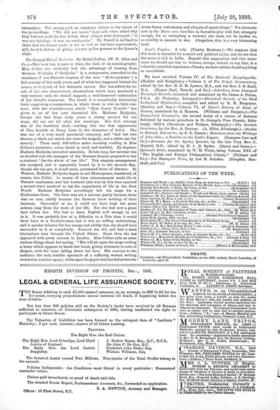The Story of Helena Modjeska. By Mabel Collins. (W. H.
Allen and Co.)—This book has, in part at least, the look of an autobiography. Miss Collins has evidently had the advantage of hearing from Madame Modjeska (" Modjeska" is a compromise, conceded to the weakness of non-Slavonic tongues, of the true " Modrzejewska") a fall account of her early years, and of what has happened behind the scenes, so to speak, of her dramatic career. She has added the re- sult of her own observations, observations which have prbduced a very earnest—and, we should suppose, a well-deserved—admiration of her friend's character. The result is a remarkably interesting book, suggesting a comparison, in which there is also no little con- trast, with the reminiscences which "Miss Fanny Kemble" has given to us of her own theatrical life. Madame Modjeska, though she had from early years a strong passion for the stage, did not act till after her marriage. Her first attempt was of the humblest kind,—nothing like the first appearance of Miss Kemble at Drury Lane in the character of Juliet. She was one of a very small provincial company, and "had but two dresses, a black one which she wore for tragedy, and a white one for comedy." These early difficulties make amusing reading in Miss Collins's narrative ; every detail is vivid and truthful. By degrees, Madame Modjeska attracted attention. Before long, her success was so decided that the manager of the Warsaw theatre proposed to her a contract "for the whole of her life." This singular arrangement she accepted, and is apparently bound by it to the present day, though she can get, it would seem, protracted leave of absence. At Warsaw, Madame Modjeska began to act Shakespeare, translated, of coarse, into Polish. In course of time circumstances made life at Warsaw unpleasant, and her husband (she was by this time married a second time) resolved to try the experiment of life in the New World. Madame Modjeska accordingly left the stage for a Californian farm. The farm was not a success, partly because there was no rain, chiefly because the farmers knew nothing of their business. Successful or no, it could not have kept the great actress long from the work of her life. But she had now a great task before her. She had to learn English well enough to act in it. It was probably less of a difficulty to a Pole than it would have been to a Frenchwoman, but it was no trifling undertaking, and it speaks volumes for her energy and ability that she should have succeeded in it so completely. Succeed she did, and had a most triumphant tour through the United Sfates. Since then she has appeared with great success in London. Miss Collins tells us some curious things about her acting. "She will sit upon the stage writing a letter which appears to break her heart, giving utterance to sobs of despair, with the tears falling down her face. She conveys to the audience the real, terrible spectacle of a suffering woman writing words that cost her agony; while upon the paper that lies before her she draws funny caricatures, and all sorts of queer things." Yet when she acts in the Dame aux Cornelius (a favourite play with her, strangely enough, for so exemplary a woman) she must not be spoken to, so terribly in earnest is she. Altogether, this is a very interesting book.


































 Previous page
Previous page